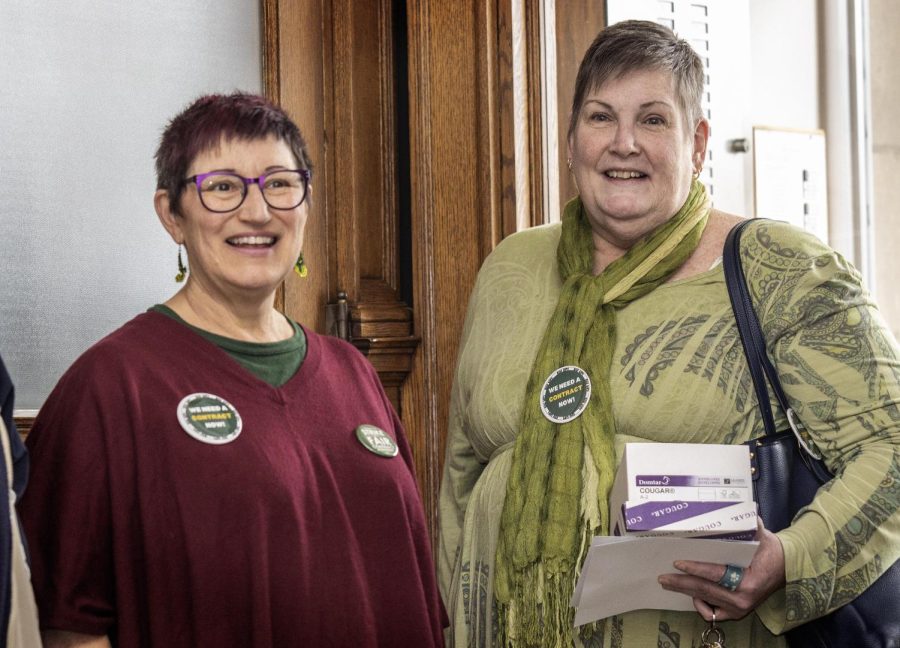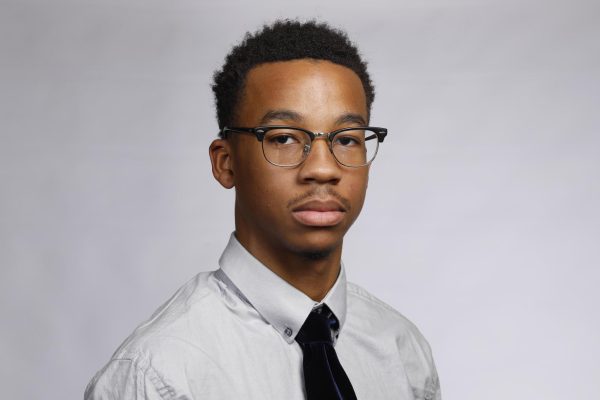Jeannie Ludlow: Being a feminist while teaching women’s history
Jeannie Ludlow (left), a member of the University Professionals of Illinois chapter for Eastern Illinois University, talks with EIU-UPI President Jennifer Stringfellow before the group delivers, according to the Union, around 1000 signed postcards in support of increasing contract raises to University President David Glassman’s office Monday afternoon.
March 1, 2023
Jeannie Ludlow, a professor English and director of women’s, gender, and sexuality studies said that she gained interest in women, gender, and sexuality studies because she was simply born at the right time.
With being born in the late 1960’s, there was always coverage of the Civil Right Movement around her, as well as feminist and LGBTQ+ Rights Movements.
“My daddy says I was born a feminist,” Ludlow said. “He tells a story, I do not remember this, but he tells a story that I tried to organize all of the girls in my class in second grade and I got in trouble … that would have been 1968. I got in trouble for trying to do a feminist action in school.”
She said that she always saw the Black Panther Party and what women were accomplishing on the news, which initiated her interest in women’s history.
The women in her family also contributed to her interest.
“The women in my family were very strong willed, strong bodied and stubborn, one might say,” Ludlow said. “So, to me, it never made sense to think that women should be weaker or protected. It didn’t track with my life in any way.”
Ludlow grew up on a farm close to Danville, Ind., and saw all her family members doing the same thing, which opposed the typical stereotype of what a man/woman’s job entailed.
Growing up on a farm close to Danville, Ind., Ludlow went to a “very conservative church” and recalls contributing to a debate in high school defending an anti-abortion stance, because that was what the church taught her, she said.
While that may not be the same mindset she has today, she still took some inspiration from the church.
“I don’t agree with everything that church taught, I believe that my commitment to justice and fairness is the same as what I was taught in the church,” Ludlow said.
While attending college at University of Indianapolis, formerly known as Indiana Central University, Ludlow started majored in music. She intended on becoming a music teacher, which was one of two options if someone was a music major, the other being a performer.
After taking her first education class, the head of the department called Ludlow into his office.
“He called me into his office, and he sat me down and he said ‘You cannot teach high school. You will never be a good enough high school teacher. You’re too small, your voice is too high and you never have the authority in the classroom,’” Ludlow said. “…I wanted to be a band director and it kind of broke my heart and it kind of broke my spirit a little bit.”
Ludlow was already double majoring in English and Music, but decided to drop the music major to a minor her senior year since it would be the fastest route to graduate.
Currently, Ludlow is teaching Women’s Gender and Sexuality Studies, Intro to Women and Gender Studies, Feminist theories, and Queer Theories. Next semester she will teach a class in Ecofeminism.
Ludlow said that she has two answers that she wants her students to take away from her classes: the one she’s supposed to give and the one she wants to give.
“The answer I’m supposed to give is that we are working to teach students to see gender as a significant category analysis in our society and to see that, everything that we do is shaped in part, not completely in part by gender,” Ludlow said.
Opposingly, the answer that she wanted to give was very different from the one she is “supposed to give.”
“Deep down inside, I want [all the students] to be feminists when I’m done with them,” Ludlow said. “And they all know that it’s politically incorrect for me to say it, but I mean, why else would I do this work?”
She said that she thinks about how everything she does is tied into social power.
As a white person, she said that she has supremacist power and she needs to be aware of that, but as a woman, she said that she does not have the same privilege as a man does.
With these topics, Ludlow said that she has to be conscious with how she delivers the message of empowerment of women and people in different races and ethnicities.
At the beginning of last semester in her Women’s Gender and Sexuality Studies course, Ludlow started the first day with a poem about meditation on breath, which was also compared with Eric Gardner’s death.
She spoke on a previous experience she had earlier in the semester when one of her students came to her to talk about being able to gain comfortability with talking to her about the topics, which may not have been there the first day of classes.
She said that she still needs to work on some things to make a more comfortable environment in her classes.
Overall, she said that there are some things that need to be changed in the world, in particular with abortion, which is her main focus.
“The Supreme Court should not get away with taking away people’s rights to make decisions about their bodies, including whether trans people can have medicine or not, including whether someone who’s pregnant and cannot have that baby is allowed to not have the baby,” Ludlow said. “And so what we really need to do is keep pushing on that power.”
Cam’ron Hardy can be reached at 581-2812 or at dennewsdesk@gmail.com.
















![[Thumbnail Edition] Senior Foward Macy McGlone, getsw the ball and gets the point during the first half of the game aginst Western Illinois University,, Eastern Illinois University Lost to Western Illinois University Thursday March 6 20205, 78-75 EIU lost making it the end of their season](https://www.dailyeasternnews.com/wp-content/uploads/2025/03/WBB_OVC_03_O-1-e1743361637111-1200x614.jpg)





















































